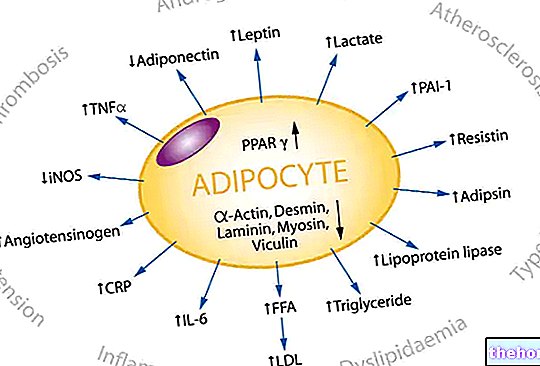What is leptin?
Leptin (from the Greek root leptos meaning lean) is a small hormone of a protein nature, discovered in 1994 by Friedman. It is encoded by the obesity gene (OB), has a molecular weight of 16 KDa and is strongly involved in the regulation of lipid metabolism and energy consumption.

Functions and properties
The discovery of leptin confirmed the existence of a communication channel between adipose tissue and the brain, which aims to regulate the accumulation of fat in adipocytes. As lipid reserves increase, white fat cells accelerate leptin synthesis to signal to the hypothalamus that food intake needs to be reduced.
Leptin decreases the sense of hunger (anorectic effects) and increases energy expenditure, favoring the reduction of body weight and fat mass.
Conversely, when fat reserves decrease, white adipocytes reduce leptin synthesis to signal to the hypothalamus that it is necessary to increase food intake and reduce energy expenditure.
Under normal conditions, leptin levels:
- they increase after the meal and are reduced in prolonged fasting;
- they are proportional to the fat mass present in the organism (greater in obese, smaller in thin people). However, the latter are more sensitive to the action of the hormone.
Other functions
In addition to regulating the sense of satiety, leptin also intervenes in the regulation of numerous biological functions:
- regulates thyroid activity;
- facilitates hematopoiesis;
- regulates the immune system (leptin enhances the immune defenses to the point of triggering real autoimmune diseases);
- regulates the reproductive system (promotes the secretion of gonadotropins; it is also produced by the placenta);
- regulates bone formation.
Therapeutic potential
Experiments on laboratory mice gave the following results:
- the administration of leptin reduces food intake and increases energy expenditure;
- mice lacking the obesity gene, and therefore unable to produce leptin, become obese, as do those with defective receptors for the hormone.
Despite the positive results obtained in laboratory mice, the total efficacy of leptin in the treatment of human obesity has never been proven. In fact, proven cases of absence of the OB gene are rare, while obese people more often have high plasma concentrations of leptin. Hence the hypothesis that obesity is associated with a resistance to the action of this appetite modulator. In other words, the hypothalamic receptors of most obese people are not very sensitive to the action of the hormone. The bad news does not end there. Scholars have in fact noticed that in obese people the hypothalamic receptors, even if they fail to receive the message of abstinence from food given by the high levels of leptin, are still sensitive to the drop in the concentration of the hormone. For this reason:
- when an obese gets fat the leptin stimulus is "ignored" and with it also its anorexigenic action;
- on the contrary, when an obese person tries to lose weight, the hypothalamus acknowledges the decrease in leptin and pushes the individual to search for food.
The problem, therefore, is not given by a leptin defect but by a reduced receptor sensitivity towards it. All this has considerably reduced the therapeutic potential of leptin in the treatment of obesity. Currently research is concentrating on the synthesis of hormone analogues and on alternative methods of administration capable of obviating the increased resistance to leptin.
Finally, it is worth remembering that in "man" food intake is a very complex phenomenon, because it is mediated by numerous biological signals that integrate at the hypothalamic level but also by non-energetic factors (cultural, social, emotional, etc.).




























